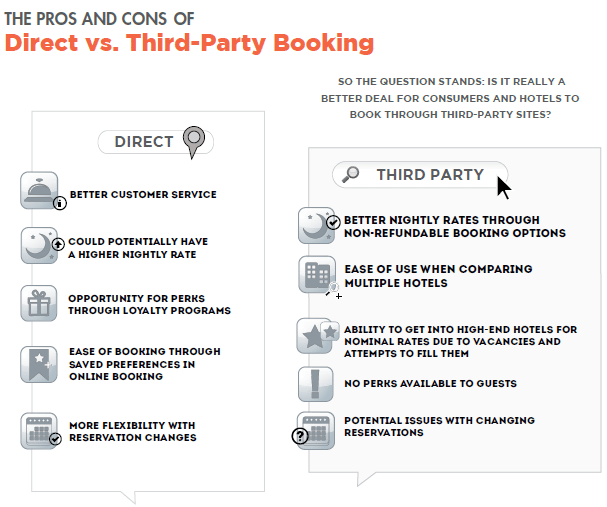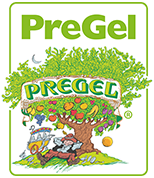Raise your hand if as a consumer, you’ve ever reserved a hotel through a third-party booking site – sites such as Expedia, Orbitz and Hotels.com. Now keep your hand raised if as a hotel, you partner with such sites to bring in additional revenue. my guess is many of you have your hands in the air because in today’s fast-paced, tech-savvy world, third-party booking sites have become the norm. Consumers are driven by price point and ease, both of which are met through third-party sites, and it gives hotels the opportunity to fill rooms that would otherwise remain empty.
Is the “Party” Really in the Third-Party?
While this seems like a win-win situation, there is the obvious downside of enabling consumers to be disloyal in terms of brands. In the age of eblasts and social media, deals literally fall into consumers’ laps, and of course it’s only human nature to take the better deal over a specific brand. So the question stands: is litreally a better deal for consumers and hotels to book through third-party sites? Or are hotels treating third-party bookers differently than direct bookers, ultimately resulting in a less-than-perfect experience for guests?
Advantage #1: Price
The first and most obvious advantage is price. The prices found on third-party sites are often less expensive than the listed price on hotel websites. What many consumers don’t realize however, is that many hotel brands commit to the “best rate guarantee.” If a hotel commits to this philosophy, it is important that they ensure it is readily available so that potential guests are aware the property will match the third-party site. Having the guest book directly through the property means more revenue for the hotel brand since third-party fees will not have to be paid.
Advantage #2: Ease of Use
Next up is ease of use for the consumer, particularly when comparing several hotels. The busy consumer is more likely to pull up comparable hotels in one browser window rather than search six different hotel brands. Third-party sites allow this ease of price comparison. For hotels, it is important to ensure that your website is user-friendly and enables price comparing. This could attract the brand loyal consumer who is looking for ease of reservation process.

Disadvantage #1: No Perks Available
When consumers book through third-party sites, they are unable to use or earn points through hotel loyalty programs. In many cases, guests who are members of a hotel brand’s loyalty program will receive free upgrades on rooms – a perk that is not always accessible to third-party bookers.
Additionally, a former front office manager at a Hilton property shared that guests who booked through third-party sites are not even guaranteed a room type. In contrast, another hotel insider shared that when it comes to upgrades, the front desk employee has complete control over who gets upgraded. This person adds that it has nothing to do with how the reservation was made, just that you’re a kind and pleasant guest. To bust this myth in hotels, be sure all employees are trained to treat all guests equally no matter how they ended up there.
Another perk for consumers booking direct is the online booking systems that hotel brands offer. Consumers are able to create an account and save their preferences, making for an easy reservation process each and every time. Hotels should advertise this perk as a way to attract more direct reservations.
Disadvantage #2: Poor Customer Service
Most third-party sites outsource their customer service departments. This can result in a disadvantage for the hotel brand itself, just by association. Think about this scenario: a consumer is trying to change a reservation through a third-party that they made at a Hilton property and the customer service representative they are speaking with is either unhelpful or very rude. The consumer is likely going to have a bad taste of Hilton properties now, thanks to an unrelated customer service representative.
Melissa Roy, office coordinator at PreGel AMERICA, shares that she books travel for PreGel employees through Hotels.com 90 percent of the time. The other 10 percent she books directly, but usually just to get corporate rates that PreGel has set up at certain hotels. Contrary to this being a disadvantage, Roy states, “I find that the customer service is the same whether booking directly with a hotel or through a website such as Hotels.com. Booking hotels through Hotels.com is more time-efficient than calling a hotel directly because I can create an account and have all the information saved that is needed to book a hotel, but when I do have an issue and I have to call customer service, the staff is very friendly and takes the time to work with me on the issue until it is resolved.”Be sure when partnering with third-party sites that you do your due diligence and ensure that the sites you are interested in working with regulate their customer service.
Disadvantage #3: Hard to Change Reservations
Once consumers have booked a reservation through a third-party site, it is often hard to change dates or hotels. One reason being that many of the rates on these sites are cheaper but non-refundable rates. Additionally, it is always harder to solve issues when there is a middle man involved. It’s better to go directly to the source for changes.
Entrepreneur.com recently predicted that reciprocal loyalty will take center stage as a 2014 trend. They describe reciprocal loyalty as that “in which not only are customers loyal to a brand through advocacy and brand support, but the brand is also investing back into the customer through rewards, personalized experiences and customer service.” This trend is good news for hotel brands as brand loyalty has been swept to the wayside by third-party sites. To stay relevant in the industry, reassess your loyalty program and ensure your hotel is meeting this demand.
The bottom line is consumers will continue to book through third-party sites for the sole reason of price point and ease of use. As a hotel, a way to compete is to provide a direct booking solution for consumers based on pricing and ease. While partnering with third-party sites does help get rooms filled, continue to promote loyalty programs to create an avid following for your brand. Once you have the consumer at your property no matter how they got there, if you treat them well you can attempt to create a loyal customer.
